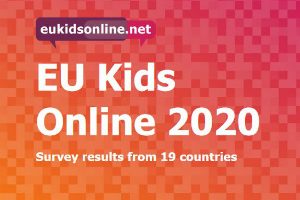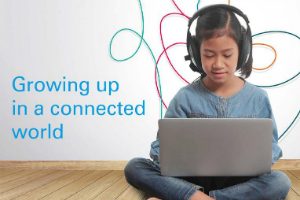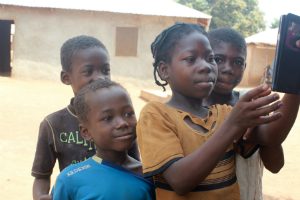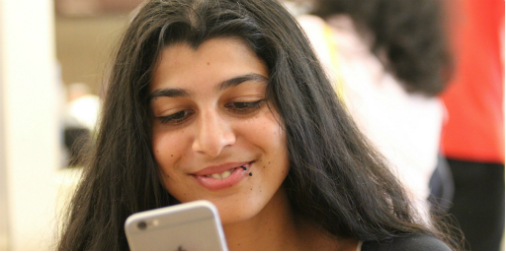 The very latest findings, published for the international Safer Internet Day 2020, come from our sister project, EU Kids Online. By comparing survey findings from over 25,000 children in 19 European countries, EU Kids Online reveals that:
The very latest findings, published for the international Safer Internet Day 2020, come from our sister project, EU Kids Online. By comparing survey findings from over 25,000 children in 19 European countries, EU Kids Online reveals that:
- The majority of children use their smartphones ‘daily’ or ‘almost all the time’, marking a substantial increase in both the proportion of smartphone-using children, and the amount of their internet use, compared with the 2010 survey;
- But while the time that children spend online each day has almost doubled in some countries, many have yet to receive any online safety advice from parents, teachers or friends.
- When children have a negative experience online, they mostly speak to parents or friends, and only rarely tell teachers or professionals whose job it is to actually help them.
- For more findings, visit www.eukidsonline.net
These findings echo those of Global Kids Online’s 11 country comparison, Growing up in a connected world, published recently. Together with other key outputs from the network, this report has led us to reflect on the lessons learned, and to think about the research agenda for the new decade.
Our highlights
 Done right, internet use can increase learning and skills: towards the end of last year Global Kids Online launched its new comparative report on internet use among nearly 15,000 internet-using children in 11 countries across Europe, Africa, Southeast Asia and Latin America. The report finds that children who participate in a wider range of online activities are more skilled in using the internet, while those whose access to the internet is more limited tend to have weaker digital skills. Support from parents and teachers enables children to engage in a wider range of online activities, improves their skills, and reduces their exposure to risk.
Done right, internet use can increase learning and skills: towards the end of last year Global Kids Online launched its new comparative report on internet use among nearly 15,000 internet-using children in 11 countries across Europe, Africa, Southeast Asia and Latin America. The report finds that children who participate in a wider range of online activities are more skilled in using the internet, while those whose access to the internet is more limited tend to have weaker digital skills. Support from parents and teachers enables children to engage in a wider range of online activities, improves their skills, and reduces their exposure to risk.
Designing children’s pathways to online participation: in a report based on findings from Bulgaria, Chile and South Africa, we argued that there is a ‘ladder’ of online participation. Many children, especially younger ones, enjoy some of the fun and sociable opportunities that the internet provides, but do not climb the ‘ladder’ to reach the civic, informational and creative activities that are often heralded as crucial opportunities of the digital age. Existing differences amongst the countries suggest that there is scope to design children’s pathways to online participation in different ways.
Influencing policy and practice, building global understanding and action: we recently launched the results from an independent evaluation commissioned to understand the ways in which Global Kids Online research has been taken up and used in partner countries and internationally. The study found that Global Kids Online research findings are regarded as the premier resource on children’s experiences online, both in partner countries and by international stakeholders and influencers. The research has been used extensively to influence policy and practice in nine partner countries, to build global understanding and action, and to influence international debate and action.
Key lessons from research
 These key outputs combine the efforts of many Global Kids Online partners across a growing number of participating countries and the know-how that the network has built over the years. In all of our work, country findings provide crucial inputs to the international debate. During 2019, we learned from these latest studies:
These key outputs combine the efforts of many Global Kids Online partners across a growing number of participating countries and the know-how that the network has built over the years. In all of our work, country findings provide crucial inputs to the international debate. During 2019, we learned from these latest studies:
Mobile-only internet use continues to grow: this year saw the 7th edition of the ICT Kids Online Brazil survey – the longest-running in the Global Kids Online network with annual waves since 2012 and one of the largest. The latest wave shows that, while inequalities in access to and use of digital technologies persist, some of the gaps are slowly decreasing. Children from higher socio-economic backgrounds still have better access to the internet but children from poorer backgrounds are slowly catching up.
Younger children are less confident in their digital skills, particularly when it comes to managing privacy: this is demonstrated by the latest research with children from New Zealand. The study also shows that most kids use the internet for entertainment, learning and socialising and social media is ubiquitous among children of all ages. The full report on children’s internet use in New Zealand will be launched on Safer Internet Day (11 February 2020).
Overcoming the digital divides through learning: a new study on children’s internet use in Costa Rica found important digital divides related to access, opportunities and skills. Younger children have more limited access than their older peers, children from urban areas take more advantage of the entertainment and learning opportunities than children from rural zones, and there is a high variability of digital skills by age and geographical area. The study shows that using mobile phones for learning at school and receiving enabling mediation from parents can improve children’s digital skills and access to online opportunities.
Should we include more digital technologies in teaching?: Montenegro is the first Global Kids Online country to produce comparable data on digital skills including children, parents and teachers. A national survey found that almost all teachers (94%) in Montenegrin primary and secondary schools use the internet on a daily basis. Educators tend to have better digital skills than children and parents. While teachers agree that the use of technologies improves the quality of education, many struggle to integrate diverse ways of using digital media in the learning process.
Highlights from Europe
 We have also learned a lot from recent country reports by the EU Kids Online network, with recent highlights including the following:
We have also learned a lot from recent country reports by the EU Kids Online network, with recent highlights including the following:
Children are ‘naïve experts’ when it comes to their internet experience: while children in Norway are often referred to as ‘digital natives’, new research by EU Kids Online suggests that this is an inappropriate term. It discovered that, although children often understand concepts related to the internet, they can’t always apply the practical skills related to those concepts. The findings suggest that children may need more support online.
Accessing the internet via a phone gives children more privacy, freedom and independence from parental control: a survey of 2,825 Czech children showed that 84% access the internet daily using their mobile phones and only 45% use a computer. Even the youngest children aged 9 to 10 years use predominantly their phones to go online (64% use it daily), while 29% of all children say that they are online on their mobile ‘almost all the time’. Children’s more independent internet use needs to be accompanied by the development of digital skills and literacy in educational settings and by a supportive and enabling family environment facilitated by parents and carers.
Children do creative activities online much less often: children begin to use the internet at a young age and in a personalised way – from their own mobile devices and away from parental supervision, which has important policy and practice implications, according to the report on Serbian children’s internet use. Children in Serbia use the internet mainly to engage in leisure activities, such as listening to music (80%) and watching videos (78%), to use social media (74%), to talk to family or friends (67%), or to play games (53%). Children who spend more time online have better digital skills but still a third of all children reported being upset by something online over the past year and for half of them it happened more than once.
What’s next?
 Do these findings help societies to realise children’s rights in a digital world? Our recent provocation paper examines the challenges faced by those trying to improve conditions for children, and proposes nine evidence-based recommendations for states and other stakeholders.
Do these findings help societies to realise children’s rights in a digital world? Our recent provocation paper examines the challenges faced by those trying to improve conditions for children, and proposes nine evidence-based recommendations for states and other stakeholders.
This year will bring new important developments for the Global Kids Online network, including new findings from countries with limited previous research and with large populations of children, such as India, China and the Philippines, so stay tuned. The Global Kids Online methodology has also been used as the basis for a new research project, Disrupting Harm, conducted by UNICEF, ECPAT International and INTERPOL to study how technology facilitates the sexual exploitation and abuse of children. This will result in more comparable evidence from another 12 countries towards the end of 2020.
You can sign up to receive the latest research news from Global Kids Online by email. Please forward this message to anyone you think may be interested.








